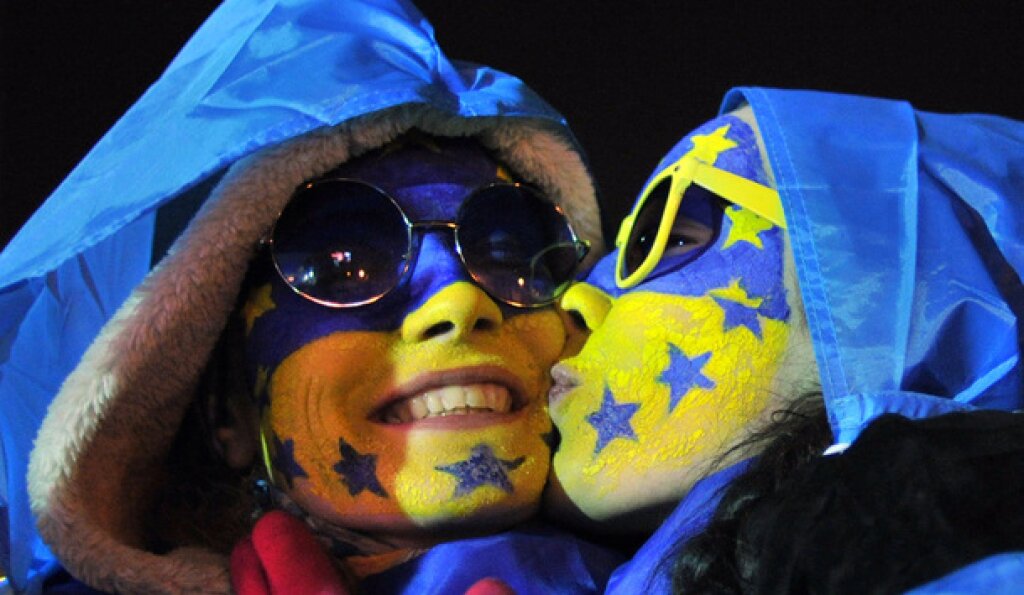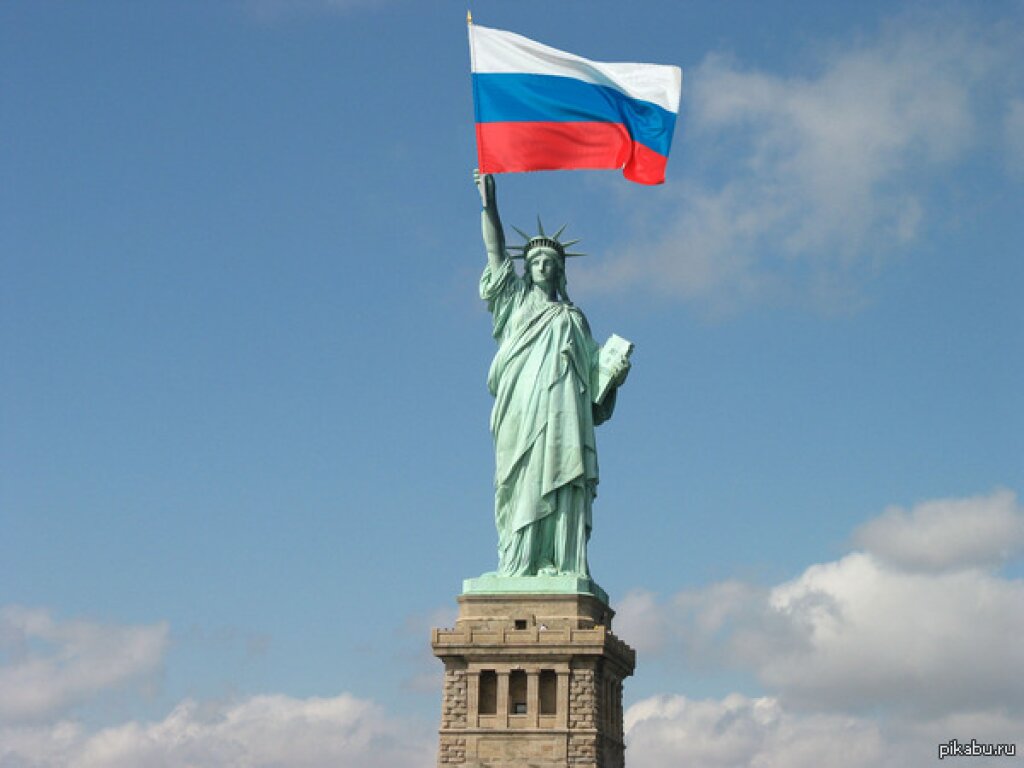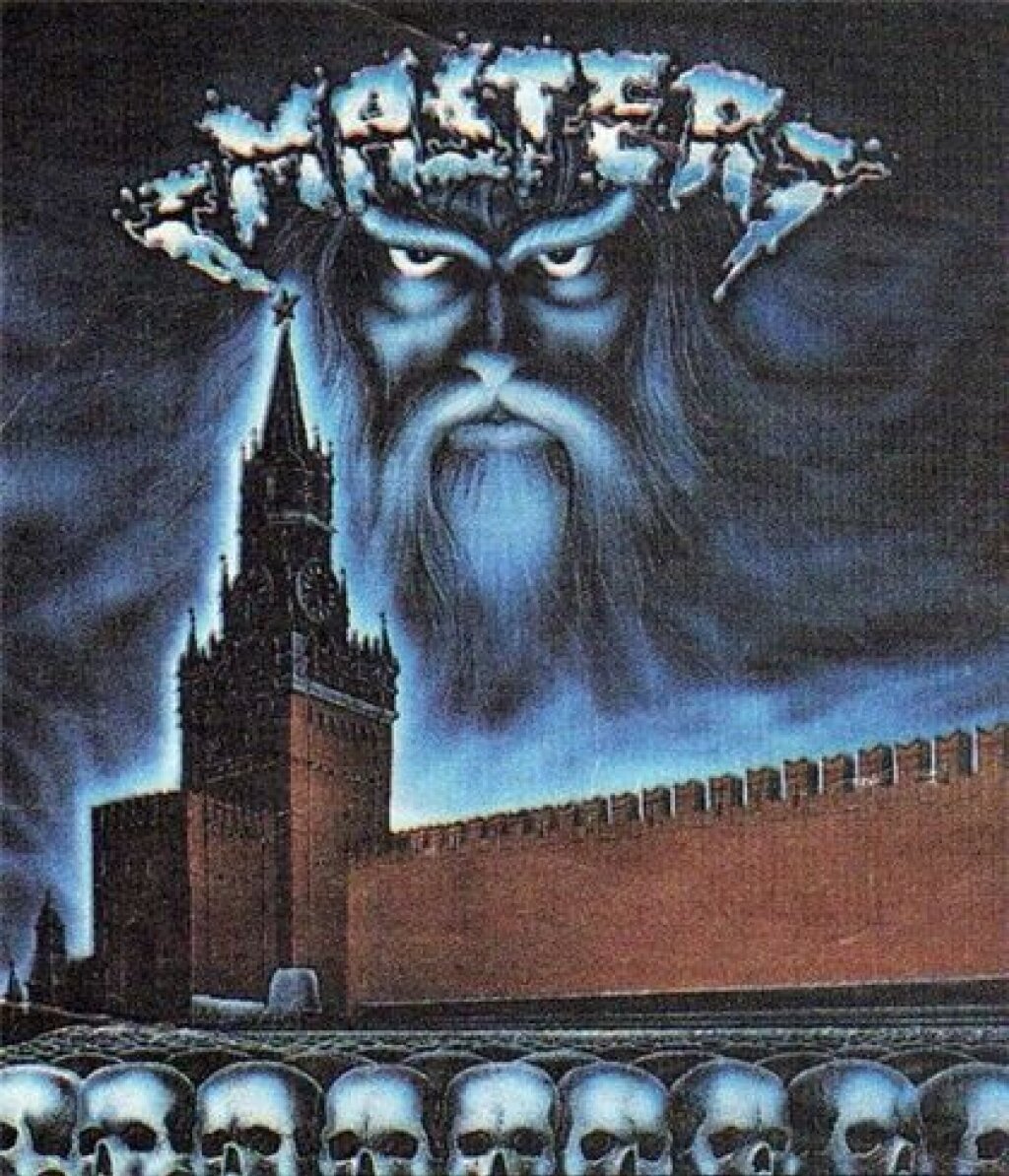Annotated and translated from the Ukrainian by Joseph Livesey,
Joseph Livesey is a doctoral student in the Anthropology Department at New York University
Andrei Portnov is the author of numerous books and articles on Ukrainian history and culture, and is the editor of historians.in.ua. He blogs in Russian at http://urokiistorii.ru.
In April this year, in the context of a war heating up in eastern Ukraine’s Donbas region, Taras Prochas`ko, a writer from the western Ukrainian city of Ivano-Frankivs’k wrote:
An entirely different people live in our far eastern regions; people whom we western Ukrainians (zakhidniaky) can neither understand nor accept, nor, in particular, consider our own. All the nice chatter about unity falls apart when one meets these people face to face. Because they know their own. And they’re nothing like us".[1]
At the end of December last year, in response to the counter-protests on the Maidan in Kyiv, organized by former Ukrainian President Viktor Yanukovych’s regime, Yaroslav Hrytsak, a historian from the western Ukrainian city of L’viv described Ukraine’s Donbas region as a place where “sovky”—the remaining human dregs of a toxic Soviet society—live: people who “don’t know how to sing carols at Christmas”, "believe horoscopes and Chinese calendars," enjoy Soviet holiday favorites, such as the variety TV show “Little Blue Light”or the mayonnaise overload that is Olivier salad, and "treat those who think differently with contempt”. In this (‘Christmas’) contribution, the author put forward his conclusion about the influence of culture and history on the present as follows: “Nations that sing Christmas carols have the better chances at achieving prosperity and dignity than those who don’t know how. So we’re going to sing carols. And we’ll teach those who either don’t know or forgot”.[2]
In May, commenting on the daily reports of fallen Ukrainian soldiers, Ostap Drozdov, a journalist from L’viv , shared the following on Facebook:
As far as I can tell, it’s only Galicians (halychany) who are dying for Donbas. I’ve already said repeatedly that keeping the Donbas in the state of Ukraine isn’t worth a single death; especially the death of a Galician.[3] So I fully support those mothers who are blocking troops from entering the Donbas, so that their children aren’t just tossed away like cannon fodder. Eastern Ukrainians should be the ones fighting for eastern Ukraine.
And in the influential Ukrainian weekly “Mirror of the Week” (Zerkalo tyzhnia in Ukrainian or Zerkalo nedeli in Russian), the same author stated that ever since the breakup of the Soviet Union “West Ukraine ... suffered in a country governed by its East".[4]
On June 13, a journalist from L’viv, Volodymyr Pavliv, reacted to the proposal to erect a defensive perimeter on the Ukrainian-Russian border by saying that “the idea of putting up a wall is all well and good, but it’s unrealistic: there would just be Russians (Moskali, a pejorative name for the Russians ) on both sides of it. Maybe just build it on the Zbruch River (a line that had previously served as a border between the Habsburg and Romanov Empires) so we don’t have to move it again?”.[5]
I could continue to provide similar quotations. The main characteristic they have in common is what I would like to call ‘Galician intellectual reductionism’, the idea that Ukraine can only succeed by getting rid once and for all of the 'hopelessly' Sovietized Donbas. Such prescriptions were not invented during the recent war. They reactivate sentiments expressed in a previous wave of outcry at the election of Viktor Yanukovych as Ukraine’s President in 2010. Many felt that votes from Ukraine’s eastern and southern regions, such as Crimea and Donbas, had condemned Ukraine to the reign of a corrupt and poorly educated scion of the criminal underworld. Yet another renowned writer from L’viv then asked: "Why do we need such a big country ?" And pompously declared that he “is letting Crimea and Donbas go”, confident that “our government will then be exclusively democratic".[6]
In coming to grips with the genealogy of such statements it’s worth recalling that in the late 1980s and early 1990s the idea of the need for Ukraine’s ‘de-Russification’, and for unmasking the falsehoods of Soviet propaganda dominated Ukrainian intellectual circles. It was hoped that this would open the eyes and cleanse the minds of those eastern Ukrainians ‘spoiled’ by outside influence. But as early as the mid-1990s it became clear that there would be no ‘de-Russification’ (especially not instantaneously), the authorities remained those same post-communist elites (for the most part representatives of the urbanized and industrialized eastern regions of Ukraine), and Ukraine’s socio-economic development left much to be desired, with actually no chance of full integration into the European Union and NATO.
Until the second half of the 1990s the conceptual model of ‘two Ukraines’ gained ground among influential Ukrainian writers. The concept envisioned a country divided by language (Russian versus Ukrainian) and history (European, that is, Polish-Austrian, versus Russo-Soviet).[7] Two Ukraines, despite all warnings and ‘postmodern irony’, were presented as two geographically defined and internally homogeneous entities (neither of which coincided with cartographic representations of language use or religion in Ukraine, but were basically consistent with maps that showed regional electoral preferences). And so, one of the Ukraines (‘eastern’) was described not just as different, but worse . While ‘western Ukraine’ became the ‘last territory’ (a theme from one of the Ukrainian author Yurii Andrukhovych’s essays). According to Andrukhovych, thanks to Austria, within the borders of which the western Ukrainian region of East Galicia had remained for one hundred and fourteen years (from the partition of the Polish-Lithuanian Commonwealth until 1918), European architecture could still be found there, distinguishing the Ivano-Frankivs’ks of that part of Ukraine, for example, "from (the eastern and southern Ukrainian cities of) Dnipropetrovs’k, Krivyi Rih, or Zaporizhzhya, which for their part have nothing to set them apart from one another".[8]
Such discussions of "two Ukraines" were helped along by a localization of academic writing on post-colonialism: its Ukrainian adherents referred to their fellow citizens in the east as ‘creoles’, producing, in effect, a narrative that Edward Said would have called ‘internal Orientalism’. Perhaps because of the force of anti-Polish sentiments in the history of the Ukrainian independence movement, certain Polish authors’broad concept of ‘Central Europe’and the common heritage of the multiethnic Rzeczpospolita (Commonwealth) were represented relatively weakly in the ‘two Ukraines’version of events. Although some writers still emphasized the important role of the historical border between the Polish Commonwealth and the ‘Wild Field’of nomadic cultures (of course, Donbas fell within the borders of the latter, beyond Ukraine’s European past). Finally, Samuel Huntington’s fantasy of a ‘clash of civilizations’ gave support to the theory of ‘two Ukraines’ by drawing a civilizational boundary along the Dnipro River, which divides Ukraine into west and east.
The image of a ‘lost Europe’ is of surprising interest because it illustrates the complex relations between European mythology and nationalism. All the authors cited here included in one or another of their writings nostalgic mentions of a tolerant ‘grandmother Austria’. In doing so, their idolization of a lost, imaginary multiculturalism has in no way stopped them rejecting and discrediting the heterogeneity we currently see in Ukraine. That no longer appears as a longed-for diversity, but as a weakness and a barrier to a successful national project!
In 2010 the literary critic Roman Dubasevych analyzed the stereotyping of Russian-speaking (eastern) Ukraine in the works of leading Ukrainian essayists. He reached the important conclusion that the same idea of ‘the nation’s purity’ and a vision of ‘national renaissance’ as a return to a ‘natural’ state of a ‘nationally conscious’Ukraine, unspoiled by a difficult history, lay at the heart of all of them.[9]
There are two sides to this model for a homogeneous and pure Ukraine. First is the naive belief that ‘the truth’ will remove the Soviet residue from the people of eastern Ukraine and have a healing effect: it will allow them to return to the nation’s ‘moral universe’. Second is the conviction that nothing will help short of amputation (for the good of both Ukraine and Donbas). In both cases, the mentality of people in the Donbas is portrayed as static and immoral. And both approaches renounce any search for practical solutions to the coexistence of various Ukraines within the framework of a single political community.
In the context of the current war, faith in the idea of national ‘purity’ often comes couched in rationalist terms, positing no known cure for the Soviet hangover in the Donbas, and, in any case, no time to look for one. Therefore, Ukraine should abandon the Donbas, and no blood should be shed. If they suddenly want it, then let the Donbas protect itself against Russian aggression. And then there’s a rhetorical question that supports such a perspective: why was it possible to destabilize the situation in the Donbas to an extent unseen either in Odessa, Kharkiv, or Dnipropetrovs’k? It draws on a conception of the Donbas`s inhabitants’particular susceptibility to Russian propaganda, and their overall rejection of Ukraine as their ‘own’state. Significantly, any arguments about language are fading into the background now that it’s no longer acceptable to question the Ukrainianness of the predominantly Russian-speaking cities of Kyiv (since the Orange Revolution) or Dnipropetrovs’k (since the spring of this year[10]).
Such changes in the concept of ‘eastern Ukraine’ reflect an important semantic shift: loyalty to Ukraine and willingness to defend the country in a situation of war have displaced the issue of language preference. They have reduced ‘eastern Ukraine’to the Donbas. Meanwhile, Donbas is no longer simply an ‘obstacle on the road to Europe’, but also a convenient negative archetype. Now other regions in Ukraine can look at the Donbas with some self-satisfaction, without mention of certain phenomena that are still found throughout the country: paternalism, bribery, and nepotism.
The political relevance of western Ukrainian reductionism is that it shifts chief responsibility for the tragedy in the Donbas away from local elites and external intervention onto the region’s population. Talk of a model Ukraine that ‘goes around singing carols’helps to preventany intellectual search for practical solutions to the coexistence of various regions. On top of that, in its own way such reductionism strikes a chord with Putinist propaganda, which seeks to show the world that Ukraine is not a proper country, a random outcome of the Soviet Union’s collapse, and a country deeply divided: all problems that cannot be solved without taking into account Russia’s ‘legitimate interests’.
The ideal of homogeneity remains key in this orientalization of the Donbas and the advancement of this national reductionism. Various authors have applied this ideal to one of the most internally diverse countries in Europe. Moreover, according to this logic, that diversity (for example, the coexistence in Ukraine of three, and not one, Orthodox churches) is seen as a weakness; if not as a defect, then as a lack of subjecthood on the world stage. This is how to lay an intellectual time bomb under the political project of a modern, open, pluralistic, and, if anything, European Ukraine. It might go off under conditions of ongoing war and deepening economic crisis. Instead of replenishing a sense of being Ukrainian in the world with new ideas and finding an appropriate language to describe Ukraine’s various elements, intellectual reductionism weakens the Ukrainian project’s claims to pluralistic values, and strengthens an exclusive nationalist discourse, to which it still claims to be opposed.
Original version in Ukrainian: Andriy Portnov, Ukraina ta ii «dalekyi skhid». Pro halyts’kyi reduktsionizm ta ioho henealohiyu, http://www.historians.in.ua/index.php/avtorska-kolonka/1231-andrii-portnov-ukraina-ta-ii-dalekyi-skhid-pro-halytskyi-reduktsionizm-ta-ioho-henealohiiu, August 01, 2014
[1] Taras Prokhas’ko, Dalekoskhidnyi ukrains’kyi front (The Far-Eastern Ukrainian Front), http://gk-press.if.ua/node/11885 (in Ukrainian). 2] Yaroslav Hrytsak, Rizdvyane (Christmas), http://gazeta.ua/articles/grycak-jaroslav/_rizdvyane/534035 (in Ukrainian). For a critical commentary see: Volodymyr Kulyk, Pro kolyadky, inshuvannya ta mizhhrupovi vidminnosti (On Chirstmas carols, othering, and differences among the groups), http://krytyka.com/ua/community/blogs/pro-kolyadky-inshuvannya-ta-mizhhrupovi-vidminnosti (in Ukrainian), and a more recent publication by Hrytsak where the author repeats his theory of the primacy of ‘values’ over ‘identity’ for understanding contemporary Ukraine, but avoids discriminatory language: Yaroslav Hrytsak, Ukraina vytrymae i tse vyprobuvannya (Ukraine will overcome this trouble), http://krytyka.com/ua/articles/ukrayina-vytrymaie-i-tse-vyprobuvannya-1 (in Ukrainian).
[3] In Ukrainian and international debate the notions of “Galician” and “West Ukrainian” are often used as synonyms, which is neither historically nor politically correct. East Galicia - present-day L`viv, Ivano-Frankivs`k and Ternopil` regions (oblast`) - geographically is just a part of Western Ukraine which also contains Bukovina, Volhynia, Transcarpathia. In my text I focus on publications by Ukrainian intellectuals from East Galicia who partly speak about “Galicians” and parly about “West Ukrainians”.
[4] Ostap Drozdov, Zakhidna Ukraina na vykhid (Exit western Ukraine), http://gazeta.dt.ua/internal/zahidna-ukrayina-na-vihid-_.html (in Ukrainian). See the author’s comments regarding allocating benefits to the children of those resettled from the Donbas upon entering higher education in other regions of Ukraine: “I want to remind everyone that (as opposed to Crimea) Donbas is not officially considered to be a temporarily occupied territory. Moreover, this region does not enjoy the status of an armed conflict zone. Therefore, in my opinion the Ukrainian state doesn't owe anything to a region where the local population is passively supporting separatists” (Ostap Drozdov, Donbas’ka dyskryminatsiya (Donbas discrimination), http://nvua.net/opinion/drozdov/Donbaska-diskrimnacya-4289.html) (in Ukrainian).
[5] See also Pavliv`s article: Ukraina dvokh shvydkostei (Two-speed Ukraine), http://zaxid.net/news/showNews.do?ukrayina_dvoh_shvidkostey&;objectId=1311587 (in Ukrainian).
[6] Yuriy Vynnychuk, Ya vidpuskayu Krym (I’m letting Crimea go), http://tsn.ua/analitika/ya-vidpuskayu-krim.html (in Ukrainian).
[7] For more, see: Mykola Ryabchuk, Dvi Ukrainy: real’ni mezhi, virtual’ni ihry (Two Ukraines: actual limits, virtual games). Kyiv: Krytyka, 2003 (in Ukrainian). For an overview of discussions at the beginning of the 2000s on the subject of ‘two Ukraines’, see: Ola Hnatiuk, Proshchannya z imperieyu: Ukrajins`ki dyskusii pro identychnist` (Saying goodbye to empire: Ukrainian discussions about identity) (in Ukrainian). Kyiv: Krytyka, 2005, pp. 360-374. For some critical publications that address Ryabchuk’s text, where the authors discuss Ryabchuk’s neglect of alternative ways of thinking about dividing up Ukraine, and his underestimation of unifying factors, see: Volodymyr Kulyk, Shchyri ukraintsi ta ikhniy othering (Genuine Ukrainians and their othering). Krytyka, 2000, No. 12 (in Ukrainian); Yaroslav Hrytsak, Dvadtsiat` dvi Ukrajiny (Twenty Two Ukraines), Krytyka, 2002, No. 4; Tat’yana Zhurzhenko, Mif o dvukh Ukrainakh (The myth of two Ukraines). Kommentariy k stat’ie M. Riabchuka «Dve Ukrainy»(Comments on M. Ryabchuk’s essay “Two Ukraines”). Perekrestki. 2005. Nos. 3-4 (in Russian).
[8] The quote is from an essay by Yurii Andrukhovych, “Erts-herts-perts” (1994), where the author provides reasons why Ukrainians should be grateful to the Austrian Empire. In actual fact, in “The Vocabulary of Intimate Cities” (2012) the author acknowledges that, having visited Dnipropetrovs’k, he realized “that I had no idea what I was talking about”, and “I should have fallen on my knees to beg the city’s forgiveness for that old half-baked claptrap”.
[9] Roman Dubasevych, Dity rozpachu (Children of despair), http://www.telekritika.ua/daidzhest/2010-12-20/58543 (in Ukrainian).
[10] For more on Dnipropetrovs’k and the dynamics of its recent transformation, see my essay (in Russian): Andriy Portnov, Dnepropetrovsk. Tam, gde nachinaetsia Ukraina (Dnipropetrovs’k: The place where Ukraine begins), http://gefter.ru/archive/12617.



